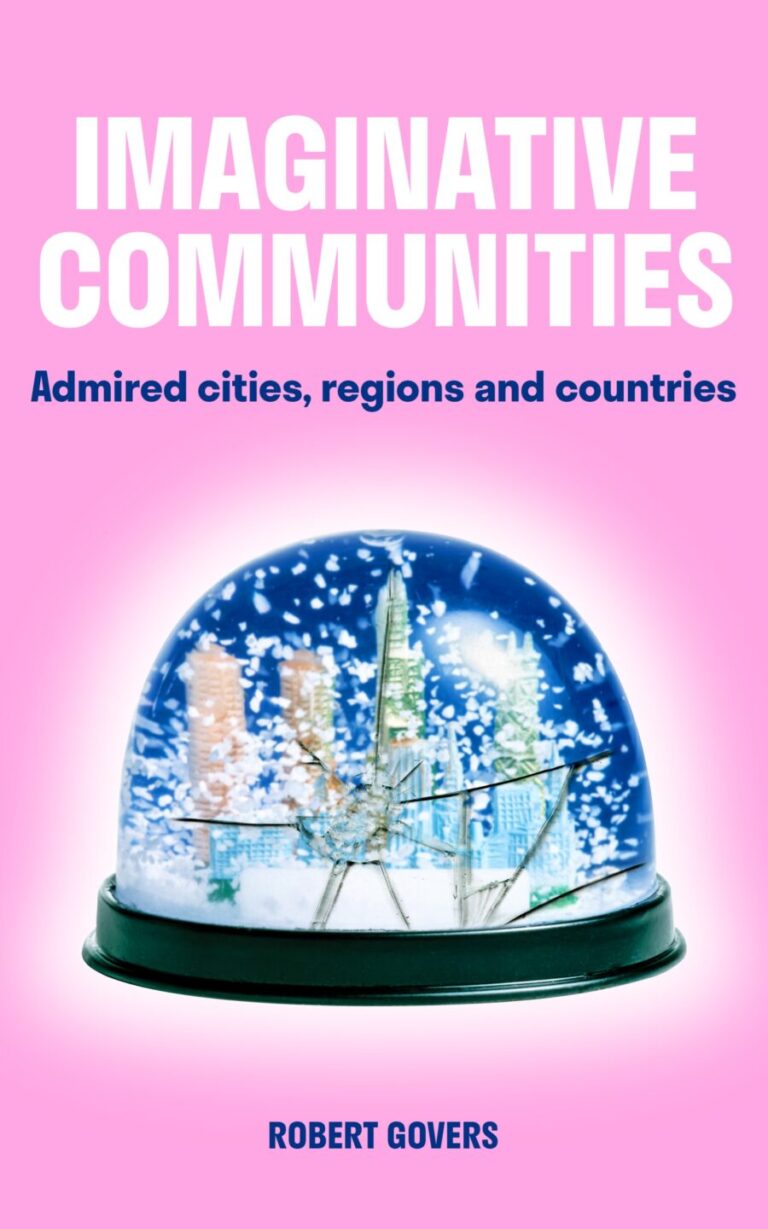
IMAGINATIVE COMMUNITIES received a 4+ star review, making it an IndieReader Approved title.
Following find an interview with author Robert Govers.
What is the name of the book and when was it published?
IMAGINATIVE COMMUNITIES: Admired cities, regions and countries; September 2018
What’s the book’s first line?
Today people are uprooted and they question the meaning of community. Is the USA still the land of freedom and opportunity? Is Paris still the city of romance? The United Kingdom a global power of significance? The Netherlands the model country for a progressive tolerant world, with Amsterdam as the capital of open-mindedness? Syria and Iraq’s Mesopotamia the cradle of civilization? Rio de Janeiro the party capital of the world? The Himalayas the center of spirituality?
What’s the book about? Give us the “pitch”.
Many of us feel uneasy with the lack of recognition that our community, city, region or country receives internationally and with the stereotypes and outdated clichés by which “outsiders” define us. This has probably been the case for as long as man exists, but in today’s world with its global connections and social media, it is becoming more apparent, more relevant and more frustrating; to citizens generally, but in particular to policy makers, public administrators, leaders and representatives in public, private and civil society sectors. Why this is so and what to do about it is the topic of this book. It is the first book to discuss the issue of community reputation in a manner that is accessible to all; free from any use of jargon, management terminology or unnecessary complexity. It argues that for communities to be admired, they need a sense of belonging and purpose in order to do amazing imaginative things befitting their character while captivating others. Imaginative initiatives are recognisably from somewhere and hence cut through the clutter in order to create community profile. The book contains examples from Austin, Barcelona, Bhutan, Den Bosch, Dubai, Egypt, Eindhoven, Estonia, Finland, Firenze (Florence), Kazakhstan, Lanzarote, Limburg (Maastricht Region), Oslo, Rome, The Hague, the United States of America and other communities. The book primarily aims to inspire readers and offer them a broad overview of an issue in modern society that is of interest and relevance to all of us: the reputation of our communities.
What inspired you to write the book? A particular person? An event?
The story of how this book came about is quite a funny anecdote, actually. Believe it or not, but it was Frank Underwood, POTUS in House of Cards, who triggered me to write this book; quite literally. In episode 8 of season 3, Underwood defends daring new policy that he invented. He explains to the bystander behind the camera – i.e. us, the audience, in the way that is so typical for this Netflix series – that in order to attract attention leaders need to come up with imaginative initiatives. They need to do things in an original, extraordinary, inventive and captivating manner. It is not so easy to do that, Underwood explains. He tells us that ‘imagination is its own form of courage’.
To venture into uncharted territory, which – by definition – is what imaginative initiatives are about, requires real courage. Underwood also explains that policy makers usually prefer to do things that are tried and tested and easy to defend with common sense, but he then intimates to the audience that “there is only one problem with common sense… it is so common”.
Underwood made me see that this is one of the key issues with reputation management for cities, regions and countries. I have argued many times before in my other books that reputation is built on action and not advertising and to stand out is to do something extraordinary. However, policy makers are often risk averse, because of pressures from the opposition or public opinion and the motivation to cling onto power and not stick their neck out too much.
Hence it should not really surprise us that very few communities have been able to launch truly imaginative initiatives that have changed the way in which they are perceived internationally. Such examples are few and far between, but I describe some of them in the book. Yet, from a policy making perspective, to do imaginative things in line with long term strategy in order to build a consistent positioning is even harder.
I have been very frustrated with the lack of recognition of the complexity of this field of “community reputation management”. It is too easily and too often pushed into the marketing domain, which is counterproductive.
Without senior government support and courage; recognition of the need to see this as a perspective to policy making more than anything else; as an overarching task; requiring collaboration between government departments, private sector and civil society; and a long term commitment; there is no hope in hell of ever moving the needle on “brand equity”.
I wrote IMAGINATIVE COMMUNITIES in the hope of moving place reputation management into the mainstream. To convince policy makers, civil leaders and decision makers generally that community reputation management is a serious challenge and requires everyone’s attention.
I therefore also hope that the book makes the lives of community reputation management specialists easier, as they can use the book to authoritatively explain to their superiors and stakeholders what it is that they do and why their jobs are so challenging.
I wrote a completely jargon-free book in easy-to-read language using only 35,000 words (150 pages) in order to provide bed-time reading; digestible because of lots of examples, cases and little theory.
What’s the main reason someone should really read this book?
This book is written for readers who want to understand why some communities, cities, regions and countries are admired and others are not; for anyone who feels that the way in which their community is perceived is too negative, clichéd or stereotypical; and for those people who want to find out what can be done about it.
When did you first decide to become an author?
I came out of academia, so writing has been part of my career since my postgraduate studies.
Is this the first book you’ve written?
Since 2009 I have co-edited and authored four books on the topic of community reputation with Palgrave Macmillan publishers. IMAGINATIVE COMMUNITIES is his first book published under his own imprint. I have also co-authored over 50 journal articles, book chapters and conference papers and have delivered numerous public speeches and business publications. In addition, he is co-editor of the quarterly journal, Place Branding and Public Diplomacy and a contributor to Apolitical, the World Economic Forum Agenda and The Economist Intelligence Unit Perspectives platform.
What do you do for work when you’re not writing?
When I am not writing I advise governments in areas such as place identity, image, reputation, economic competitiveness, tourism policy and strategy, educational policy, tourism and investment promotion, and major international events. This is approached from a strategic reputation management perspective that is based on the premise that places build reputation through actions, not through propaganda.
I have been involved in many consultancy projects and advisory boards for reputable organizations such as the International Air Transport Association, the European Commission, various governments, tourism promotion boards, and regional and city administrations.
I am also chairman of the International Place Branding Association and have been an adjunct or visiting scholar at Tsinghua University, Beijing; the Indian School of Business, Hyderabad; the University of Leuven, Belgium; Rotterdam School of Management, the Netherlands; Loughborough University London Campus; IULM University Milano, Italy; and several institutes in Dubai, United Arab Emirates. He also teaches place branding on the UNESCO World Heritage at Work Master’s programme in Torino, Italy.
How much time do you generally spend on your writing?
Probably around 20% of my time.
What’s the best and the hardest part of being an indie?
The best part is to be in complete control. The hardest part is to reach readers.
What’s a great piece of advice that you can share with fellow indie authors?
Invest time and resources in marketing your book. It is the hardest part and you should start early; half a year before the book is published (to get editorial reviews, submit to awards, promote preorders and giveaways, etc.).
Would you go traditional if a publisher came calling? If so, why?
I might, if it’s a non-academic publisher that serves a mass market at low price.
Is there something in particular that motivates you (fame? fortune?)
Just to change the world; that’s all.
Which writer, living or dead, do you most admire?
Benedict Anderson (Imagined Communities)
Which book do you wish you could have written?
Imagined Communities (Benedict Anderson)
